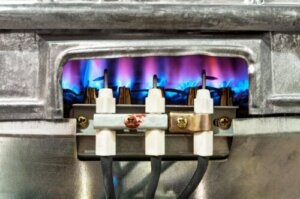Gas-Powered Household Appliances and Their Advantages

Natural gas is one of the most widely used energy sources in the home. This is especially true when talking about heaters and generating hot water. However, there are also a number of devices that offer this source as an alternative to electricity and they have a number of advantages. For this reason, we’ve compiled all the information you need to know about gas-powered household appliances.
Appliances such as dishwashers, fridges, and dryers are usually only associated with the consumption of electricity. But gas can be another way of providing them with energy. Prioritizing its consumption can represent some advantages in the operation of these appliances and in your bills.
What is natural gas and how is it produced?
Natural gas is a mixture of light hydrocarbons composed, mainly, by methane. It also contains other elements in smaller proportions, such as nitrogen, helium, and alkane variables. It belongs to the category of fossil fuels, as it’s produced from the organic remains of animals and plants that have been decomposing for millions of years.
These microorganisms were buried beneath the earth’s surface, exposed to high pressures and temperatures. Therefore, natural gas is obtained by extraction, either in single deposits of this mineral or in others associated with oil. It’s considered cleaner than other fossil fuels such as coal.
Environmental impact
It should be noted that the extraction, distribution, and use of natural gas produces greenhouse gases that contribute to global warming, mostly through carbon dioxide and methane leakage. For this reason, organizations such as Greenpeace advise against using this fuel as a solution to the fight against climate change.
However, it’s a cleaner energy source than those generated by other fossil fuels. According to a study by the University of Lima (article only in Spanish) it’s the fuel in this category that pollutes the environment the least. This is because it emits less carbon dioxide and doesn’t produce ash or solid particles during combustion.
Official agencies report that emissions are between 40% and 50% less than those of coal and between 25% and 30% less than those of fuel oil.
Another great article for you: Twelve Ways to Reuse Old Appliances
Gas-powered household appliances
Before the advent of electricity in millions of homes around the globe, gas was used to power most everyday appliances. With the proliferation of electric power, natural gas was reduced to the use of ovens, stoves, and water heating.
But many people have begun to consider the application of this source to improve the performance of the following appliances.
Cooktops
One of the main household appliances that use gas as an energy source are stoves (hobs). Although electric options began to occupy millions of homes, gas cooktops have greater power and cooking speed. In addition, regulation is usually easier.

Vitroceramics
In the same sense, this cooking system using vitrified ceramic is more efficient and faster when used with gas. In addition, it reduces costs when compared to electricity, because it isn’t necessary to increase the power of the appliance so much.
Dryers
In the area of textile cleaning, it’s possible to get dryers that run on gas and have several advantages in their performance. They are more efficient than conventional electric ones, produce fewer odors, and the clothes end up less wrinkled.
Drying is faster due to the high temperatures they generate.
Ovens
Another accessory that can use gas as its main source is the oven. In general, they’re more powerful and the food often tastes better, due to the content in water vapor. The lower running costs is another reason why many users choose gas ovens.
Washing machines
Similar to dryers, washing clothes can be faster and more efficient if the hot water is obtained by natural gas. In this way, the liquid heats quicker than with an electric motor. In addition, clothes can be washed without depriving the rest of the household of hot water (if you have an electric water heater).
Dishwashers, another of our gas-powered household appliances
Dishes and cutlery can also be washed with natural gas appliances. In general, dishwashers of this type have shorter wash cycles and reduce energy consumption compared to electric dishwashers.
Barbecues
Cooking outdoors is also more efficient with gas barbecues. Food is less contaminated, as no ash or smoke is produced. In addition, cooking is more easily regulated through temperature settings.
Fireplaces
Keeping the home heated through gas fireplaces is the best way to create a cozy atmosphere during the cold months. These objects don’t produce odors or smoke, are efficient, safe and can be regulated, something that is reflected in the monthly energy expenditure. Of course, they can be combined with other decorative elements of the home, as they’re very aesthetic.
Radiators
Other appliances that can be used with gas are radiators. They provide better performance, greater heat output, and less noise pollution.

Advantages of gas appliances
Using gas appliances has several advantages. Some are specific to each appliance, but a number of general trends can be established that favor the use of natural gas over electricity:
- Convenience: Most gas-powered household appliances are very simple to install, convenient to maintain, and affordable to use.
- Efficiency: As described in the previous section, many appliances run more efficiently on gas.
- Comfort: In terms of heating and hot water use, gas appliances are very effective and produce warm environments throughout the room.
- Savings: In general, natural gas as a household energy source costs less than electric energy.
Another great money-saving article for you: Discover the Japanese Method to Save Money
Gas-powered home appliances and energy security
There are many reasons to opt for gas-powered appliances as opposed to their electrical versions. However, safety issues regarding their installation must be taken into account. While it’s a safe and regulated energy source, there are potential dangers from improperly installed appliances.
The release of a toxic gas, such as carbon monoxide, can become a possibility if devices are installed incorrectly. Therefore, ductwork and installations should always be checked by licensed gas fitters to ensure that they’re operating safely and efficiently.
All cited sources were thoroughly reviewed by our team to ensure their quality, reliability, currency, and validity. The bibliography of this article was considered reliable and of academic or scientific accuracy.
- Benítez – Astudillo J, Robles – Salguero R, Vanegas – Aragón A, Rodríguez – Astudillo O, D’Armas – Regnault M. Sustitución de cocinas de gas licuado de petróleo por cocinas eléctricas a inducción. Un caso ecuatoriano. Ingeniería Industrial. Actualidad y Nuevas Tendencias [Internet]. 2015;IV(15):35-46. Recuperado de: https://www.redalyc.org/articulo.oa?id=215047546004
- González M, ¿La era del gas?. Revista Venezolana de Análisis de Coyuntura [Internet]. 2001;VII(2):239-256. Recuperado de: https://www.redalyc.org/articulo.oa?id=36470209
- Guzmán Jiménez, R., y Kamiyama Murakami, A. (2006). Modelo sistémico del impacto del gas natural en el desarrollo sustentable del Perú. Interfases, (1), 59-78. Recuperado de http://revistas.ulima.edu.pe/index.php/Interfases/article/view/167
- Juanicó L, Eficiencia de calefactores a gas de tiro balanceado: medición e impacto en usuarios residenciales. Interciencia [Internet]. 2007;32(12):854-856. Recuperado de: https://www.redalyc.org/articulo.oa?id=33913510
This text is provided for informational purposes only and does not replace consultation with a professional. If in doubt, consult your specialist.








